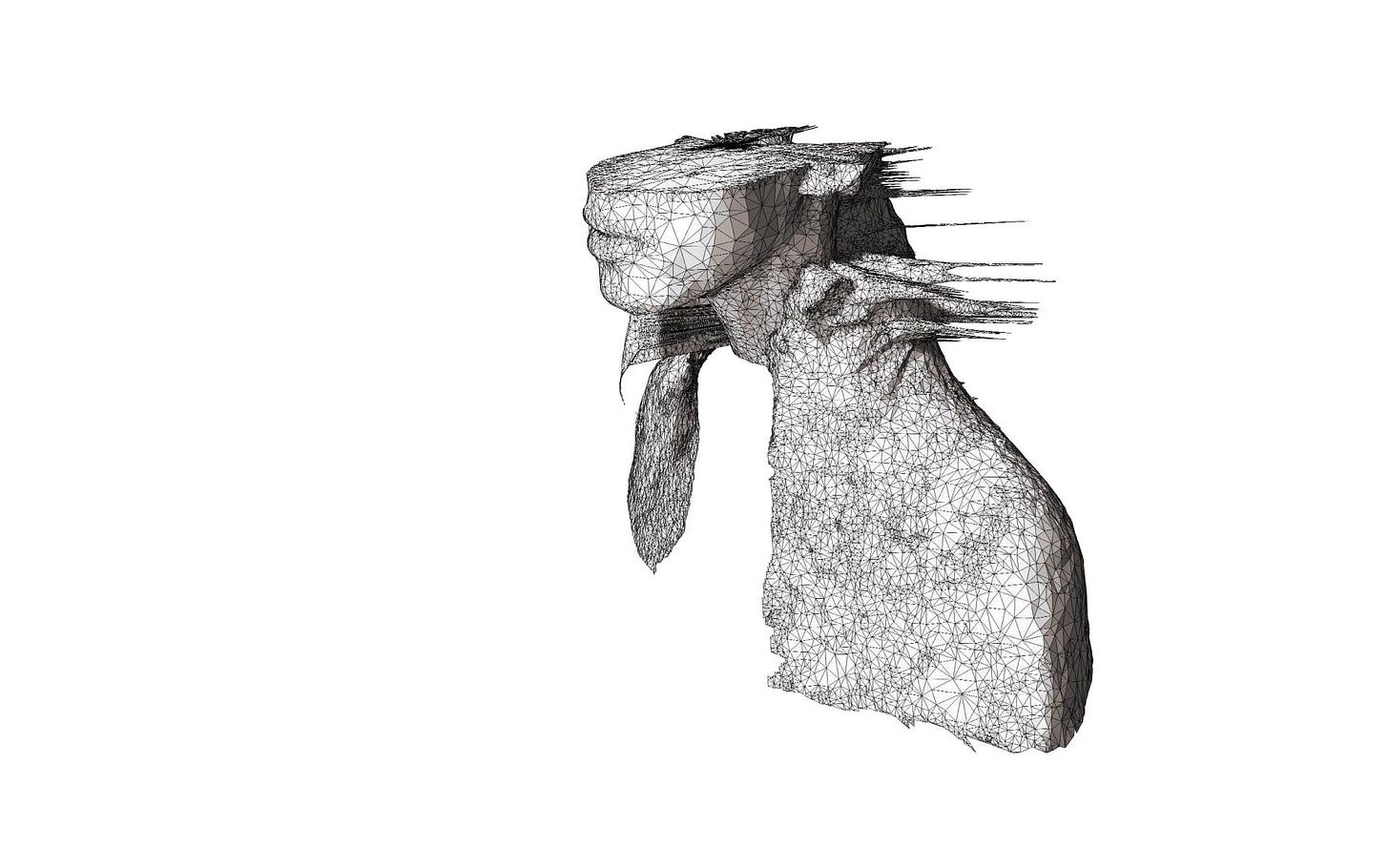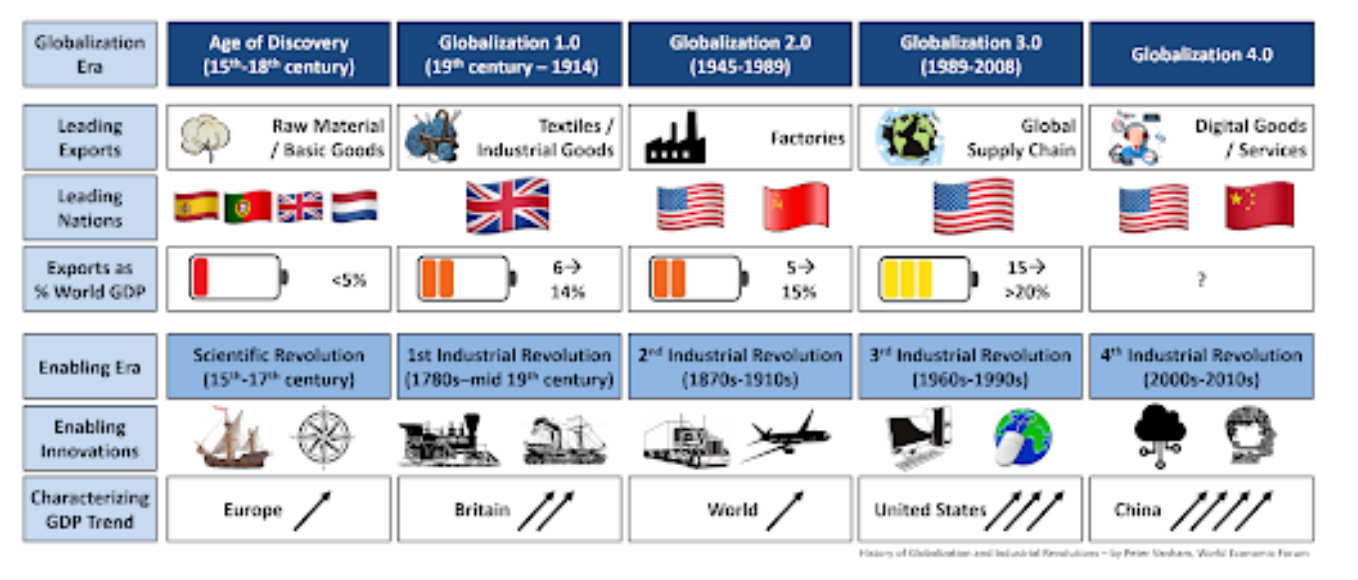Work—Places
The Factory, the Office and Cyberspace
The Set Up
“In my place, in my place
Were lines that I couldn't change
I was lost, oh yeah”
- “In My Place,” Coldplay
The band Coldplay recorded their second hit album, A Rush of Blood to the Head, the same month that Google was awarded their patent for page-rank, satellite radio became a reality, and the September 11th attack on the World Trade Centers happened. After trying and failing to work on their sophomore album in London, Coldplay left the city and its distractions to work in Liverpool, the English city famous for a history of shipping, manufacturing, and The Beatles.
Liverpool’s docks and traditional manufacturing industry were killed in the 1970’s. Cramped urban docks were made obsolete by the shipping container, which made deep water ports and large storage facilities paramount. This ended the era of metropolitan docks in close proximity to the urban core. It would not be the first, or the last time that a technology changed how place, meaning and work are related.
Google, satellite radio, and 9/11 are in retrospect, the high-water marks of accelerating globalization. It would be another 15 years before globalization began its retreat, but the rate of globalization peaked in 2001. It was the end of The End of History, and the beginning of post-history.
The search engine an always on, universally available, global information index transformed how knowledge is found, digested, and shared. This technology ended the era of scarce information and ushered us into an era of scarce truth. Now it was possible for anybody with an internet connection to become an autodidact, and the global pool of human capital skyrocketed, while simultaneously, online fraud and scams exploded.

(2002) Artwork for A Rush of Blood to the Head by Coldplay. - Sølve Sundsbø
Satellite radio (and later satellite internet), provided the same level of availability and access to entertainment that GPS had provided for navigation. Entertainment, news, and political media could now appeal to micro audiences spread over wide geographies. This change redrew social groups along class and educational lines, as opposed to geographic ones. People in a given region used to listen to the same radio stations, watch the same local news programs and read the same local newspaper. Now people living in the same apartment complex listen to the same music as their college friends, watch the same tv channels as their coworkers and read the same blogs as their political tribe. Just like the search engine, global access eroded our traditional ties based on geography.
Al Qaeda, a global network of anti-globalists, was in part a response to U.S. global hegemony. Those most likely to join radical violent organizations are the “young and normless.” Sometimes they are stateless or culturally lost youths who never find a way to fit in. Given the sensitivity of this topic, I want to make clear that I am not equating Google, satellite radio, and Al Qaeda. That does not mean the three events from September, 2001 are unrelated.
Google and satellite radio were accelerants to the disembodiment that Coldplay felt in London. Al Qaeda, among many other disturbing things, is a reactionary movement opposing the globalization of Western norms. Globalization, driven by information technology is redrawing our networks of trust, power and identity.
The Place
Identity
“… what was the use of my having come from Oakland it was not natural to have come from there yes write about it if I like or anything if I like but not there, there is no there there.[95]
…. When you live there you know it so well that it is like an identity a thing that is so much a thing that it could not ever be any other thing and then you live somewhere else and years later, the address that was so much an address that it was like your name and you said it as if it was not an address but something that was living and then years after you do not know what the address was and when you say it is not a name anymore but something you cannot remember. That is what makes your identity not a thing that exists but something you do or do not remember.”
- Gertrude Stein, Everybody’s Autobiography
We are physical beings… Or at least semi-physical. Things exist in space and in our mind, and their overlap might be called identity. The passage of time and movement through space are how we orient our selves in relation to the world. Just time and movement, are however are not enough to create identity. This requires the mind endowing time and movement with meaning.
When Gertrude Stein coined the phrase, “there is no there there” she was lamenting the loss of identity, the connection in her mind between a physical place and its meaning to her. So what does this have to do with work? As Stein noted, a place can have an identity, just as a person can, and a person who works in a place shares some of their identity with that place.

There really is no there there.
The rituals Stein alludes to, saying or writing your home address, unlocking your front door, hosting a party, give a place a sense of meaning. That is what people mean when they say a place, “feels like home.” It is comforting and familiar to us, in the same way that the spaces we associate with those rituals feel. With the uninhibited flow of communications and information, however, we are using our homes for much more.
Now people learn from home, worship from home, and work from home. This kind of schizophrenic relationship to place is difficult to adapt to. It blends the meaning of places. Is my couch a classroom if I take an online course? Does the practice of yoga or meditation make my bedroom a temple? Is my dining room table for eating or working?
Work
We can discover this meaning in life in three different ways: (1) by creating a work or doing a deed; (2) by experiencing something or encountering someone; and (3) by the attitude we take toward unavoidable suffering
- “Man’s Search for Meaning,” Viktor Frankl
One of the main ways we create meaning for ourselves is through work. The drive to create, making a difference, or leaving a legacy are often cited as one’s purpose in life. It is no surprise, then that the places in which we do work hold a special meaning for many people. Particularly for those who do physical work that depends on their relation to a specific place. Factories, farms, docks and workshops are intrinsically related to our self conceptualization.
At one of the earliest modern factories, the Venetian Arsenal, work identity was strong enough to assimilate the Greeks who manned the ships that the Venetians built:
The Arsenal shipbuilders, a socially and economically homogeneous group, were responsible for constructing the Venetian galleys. Because of the significance of their work, they gradually developed a strong sense of professional identity, which is manifest in their collective labelling as ‘Arsenalotti’. Complementing them in building and manning the vessels were the ‘maritime’ Greeks, one of the numerous immigrant communities established in the city. Although a diaspora group, by the sixteenth century they were well-integrated Venetian subjects, distinctly uniform in their ethnic and religious individuality.
- “Pestilence, poverty, and provision:re-evaluating the role of thepopolaniin early modern Venice,” Ioanna Iordanou
If a factory, and the work done there, has enough significance and meaning to override our national and ethnic ties, imagine the damage that can be done when the factory ceases to exist. The hyper division of labor and a global supply chain has scattered manufacturing processes across the world. We didn’t even need to wait for the robots to take all the factory jobs, we depersonalized and disembodied the work long before the robots will take over.
The death of American labor is perhaps best summed up by “The Wire,” season two, released just a few years before peak globalization, in 2003. Here’s a clip to illustrate:
In this clip, a lobbyist explains that the local union leader of dock workers lost his bid to build a grain pier and create more work for dock workers. No grain pier, no work. No work, no meaning. No meaning, no point in living. This fictional representation is backed up by data from the National Institutes of Health showing “the loss of 1000 trade-related jobs was associated with a 2.7 percent increase in opioid-related deaths.”
The global supply chain and outsourcing did to manufacturing what the internet is doing to office jobs. Already, information technology workers compete against IT outsourcing from Eastern Europe to India. Graphic design, administrative support, copy writing, and other easily outsourced jobs are easy to wage arbitrage. Some white collar work is less simple to send over the internet.
Trust
Amid the great weakening of American labor and the coming weakening of white collar labor is a societal level breakdown in trust. As the places we once understood in terms of having a specific purpose get reshaped, we lose our relationship to places and institutions. Standing athwart these trends are job that still rely on place in one way or another. High trust roles are still tied to in-person interactions. Bankers executing a once-in-a-lifetime deal for a business owner, pilots flying a plane, doctors in the operating room, cybersecurity practitioners, and teachers taking care of children all share this commonality. It seems to be some combination of three key traits:
Skin in the game
Location of the job (either physical necessity or legal regime)
Signalling value
The first and second are self evident enough. A physical pilot is preferable because they don’t want to die. Most operations require a surgeon to be in the same room as a patient. If you are developing intellectual property, you want to hire a programmer who would face legal consequences of ripping it off. The third is trickier and most important. The fact that people don’t always use remote work tools like video chat sends the message that it is not ideal. This is explained in detail in the paper “Beyond Being There” by Hollan and Stornetta.
The erosion of trust, through the loss of shared identity as it relates to place and work, has caused a reactionary movement towards nationalism, xenophobia and othering, just as it did in previous waves of globalization.

The question is not why are people disaffected, or how can we roll back technology, but how can we avoid conflict as a result of progress? People have a right to be upset, and it is unavoidable that technological progress will reshape society. It is up to us to avoid the twin perils of utopianism and luddism.
The Return
Don't look back. Something might be gaining on you.
- Satchel Paige
The future of identity is online. We already consume culture, perform work, and build communities online. Al Qaeda recognized the power of the omnipresent internet to build community way before Instagram and Salesforce were talking about engagement. While much of the high value work in services based economies will be performed in person, our identities are already being built online.
The challenge is to build healthy communities that reflect what we admired from physical spaces like places of worship, offices, sports stadiums, schools and town halls. To do so, we’ll have to come up with new ways to inculcate values and keep out bad actors. In “a world where every sociopath is your next door neighbor” that is not easy. To do so, new institutions for sharing power, building trust and enabling identity will have to be formed, and those who benefit most from the old power, trust and identity systems will not go along lightly.
